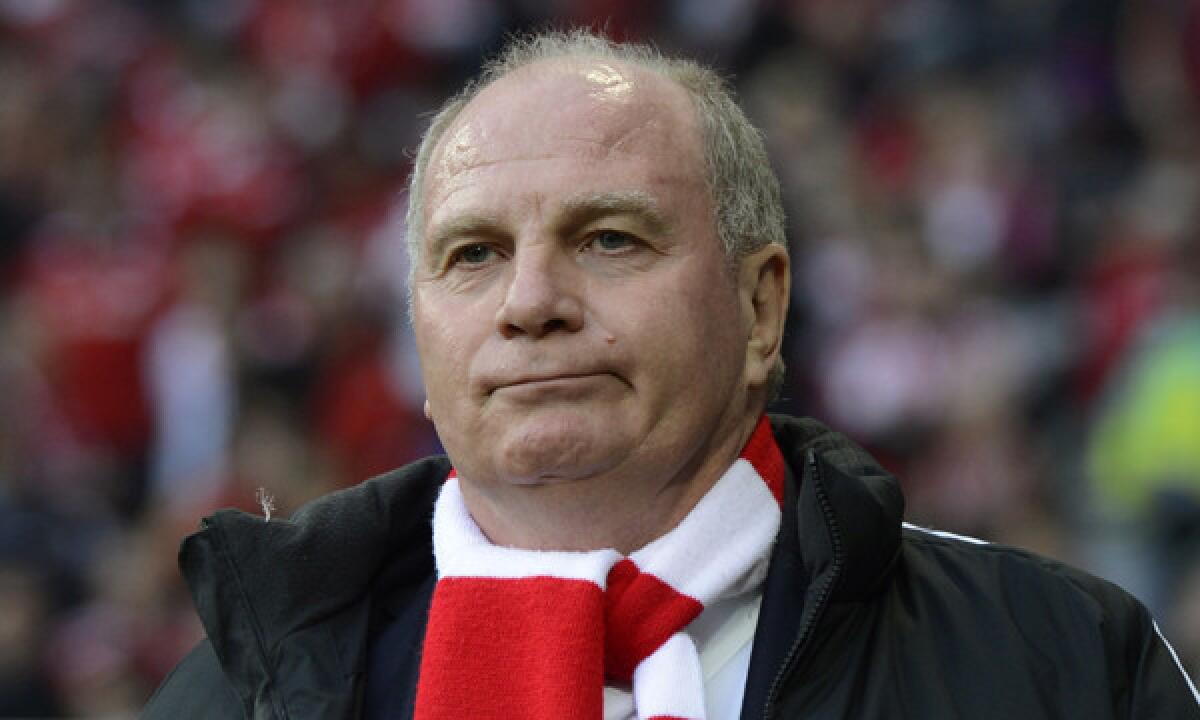Bayern Munich’s dominance threatened by scandal

Earlier this month a German court might have succeeded in doing what no soccer team in Europe has been able to do in quite some time, namely wound Bayern Munich.
Whether the conviction of team President Uli Hoeness for tax evasion is simply a minor scratch or a mortal blow remains to be seen. But Hoeness’ four-day trial, which captivated the country and embarrassed the team, couldn’t have come at a worse time for Bayern, which is completing what may be the most dominant two-year stretch in club soccer history.
With Saturday’s 2-0 victory over Mainz, Bayern moved a big step closer to becoming the first club to clinch the Bundesliga title in March. It also extended its unbeaten streak in league play to 51 matches, two better than Arsenal’s “Invincibles” in English Premier League play in 2003-04.
But that only hints at how dominant Bayern, a 22-time league champion, has been. Here’s a partial accounting of the numbers the team has run up this season:
18: That’s the number of consecutive league victories for Bayern, four better than the previous record. With eight matches to play, Bayern, which hasn’t lost a league match since October 2012, has a chance to become the first team to finish a Bundesliga season unbeaten.
64: Bayern’s goal differential in league play, more than twice as good as the next-best team. The club won one league game by seven goals, three others by three goals and four by four goals and has scored at least twice in each of its last 18 league matches while shutting out the opposition 15 times in 26 matches.
2.92/0.46: Average number of goals scored and conceded per game for Bayern. That leaves it on pace to break the record for fewest goals allowed, which Bayern set last year.
5: Titles won in the last year: In addition to the Bundesliga crown, Bayern also won the DFB Pokal, the Champions League, the FIFA Club World Cup and the European Supercup. Since the start of 2013, Bayern has lost only three times in all competitions — twice in Champions League group play after the team was already assured of advancing.
It is arguably the most dominant performance in a major international league in soccer history. And Bayern is favored to add to that at the end of the season by becoming the first team in the modern era to win back-to-back UEFA Champions League titles.
For Matthias Sammer, Bayern’s sporting director, those accomplishments add up to an impressive legacy.
“You will appreciate records in years to come,” he told reporters. “Those stats make me proud. There is something eternal about them.”
Only slightly less eternal, however, will be the stain left by the conviction of Hoeness, who, as a player, won a European championship and a World Cup with the West German national team as well as three consecutive European Cups during his 10 seasons with Bayern. After retiring because of injury in 1979, he immediately began a career as a club executive and he was equally successful there, eventually becoming Bayern’s president and board chairman.
But he resigned both posts nine days ago after deciding not to appeal his 3 1/2-year sentence for cheating the government of $39.5 million in unpaid taxes.
A butcher’s son who rose from humble beginnings to become a multimillionaire — partly by taking the family business and turning it into a sausage-maker whose global clients include McDonald’s — Hoeness confessed to hiding money in Swiss banks since 2001 while gambling on stock and currency markets, a case that mushroomed into one of the biggest scandals in German sport since the match-fixing crisis of 1971.
For more than three decades, Hoeness, 62, had been either club manager or president at Bayern, making him the longest-serving, most influential man in German soccer — experience and influence he leveraged to build Bayern into the mightiest club in Europe.
And he did that without the check-writing skills of a deep-pocketed Arab sheik or Russian oligarch. Rather it was through force of personality and phenomenal contacts that he transformed Bayern into the fifth-most valuable soccer team in the world, one he controlled from atop a board that included the leaders of Adidas, Volkswagen, Audi and other jewels of German industry.
After a loss in the 2010 Champions League final, money collected from those benefactors paid for the shopping spree that built today’s dominant Bayern club. But now the team’s chief fund-raiser is on his way to jail. And though he leaves behind full coffers, his place at the helm has been taken by Vice President Karl Hopfner, a dull numbers-cruncher who lacks Hoeness’ flair and media skills.
Adidas chief executive Herbert Hainer will take over as Bayern’s chairman, though he too lacks Hoeness’ charm and many close to the team have grown wary of the shoe company’s influence on the club.
Then there is Sammer, the East German-born sporting director who not only lacks a Bayern pedigree — he spent his Bundesliga career playing for Stuttgart and Borussia Dortmund — but has reportedly clashed with Coach Pep Guardiola.
It’s a toxic mix that could fuel a power struggle, creating schisms that would undo in months what Hoeness spent decades building. Consider how quickly Manchester United, England’s premier team, imploded after the departure of Coach Alex Ferguson.
For their part, the players insist their focus is on the field, where a mistake now would further tarnish what has been a spectacular season.
“When the whistle goes for the start then everything else is shut out,” forward Thomas Mueller, speaking of the Hoeness scandal, told The Independent of England. “I do not expect it to have any negative effect.”
That remains to be seen.
Twitter: @kbaxter11







